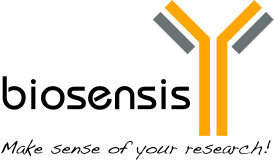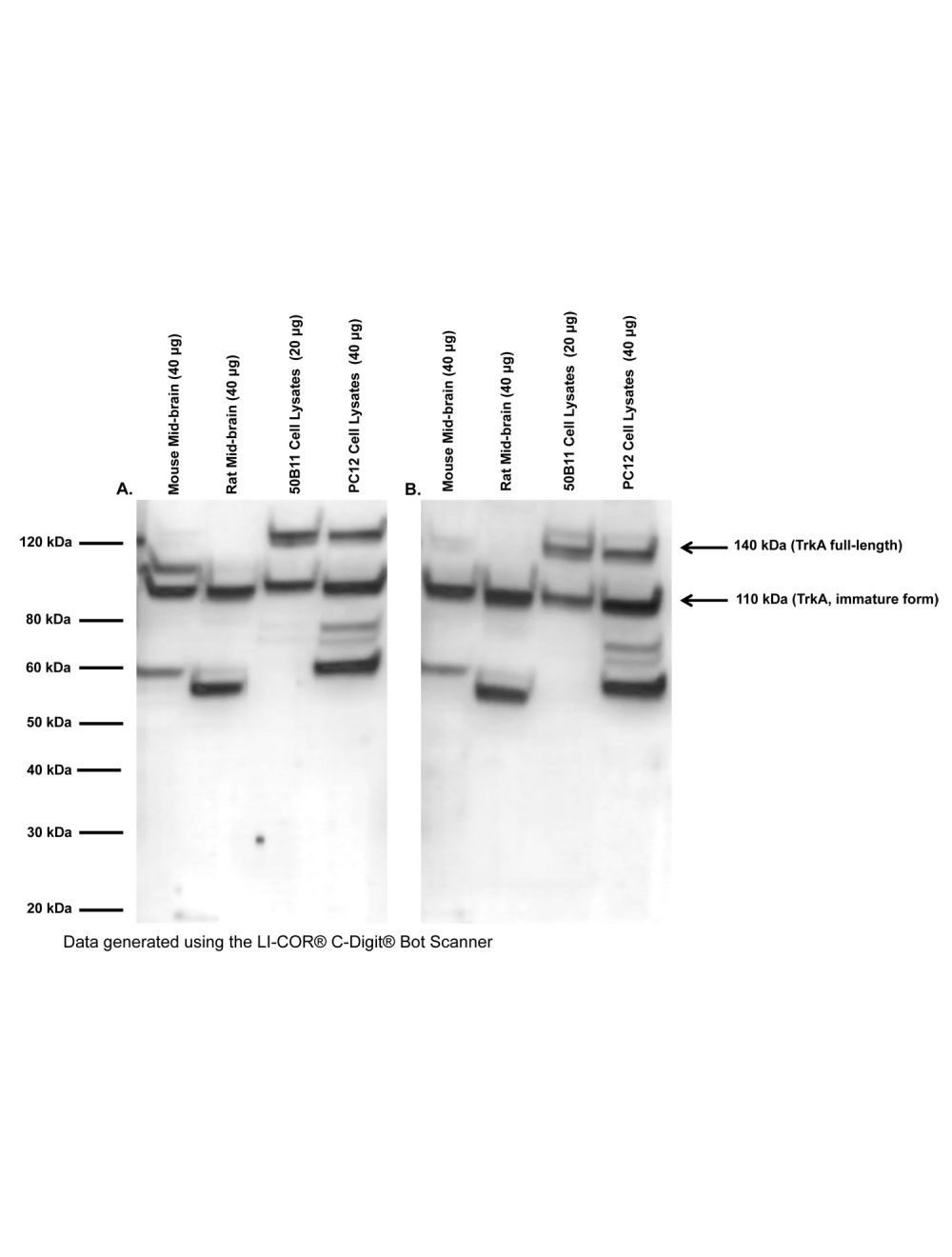Tyrosine Kinase Receptor A (TrkA), Rabbit Polyclonal Antibody
Only %1 left
Catalog Number
R-1362
Discontinued
- Product Name Tyrosine Kinase Receptor A (TrkA), Rabbit Polyclonal Antibody
- Product Description Rabbit anti-Tyrosine Kinase Receptor A (TrkA) Polyclonal Antibody (Unconjugated), suitable for WB, IHC-Paraffin-embedded.
-
Replacement Product
Please refer to R-152-100 and R-2077-200 for alternatives.
- Alternative Names Tropomyosin-related kinase receptor, High affinity nerve growth factor receptor, Neurotrophic tyrosine kinase receptor type 1, TRK1 transforming tyrosine kinase protein, p140-TrkA, Trk-A, GENE NAME: NTRK1, TRK.
- Application(s) IHC-Paraffin-embedded, WB
- Antibody Host Rabbit
- Antibody Type Polyclonal
- Specificity The specificity of this antibody has been confirmed by WB and IHC against the antigen.
- Species Reactivity Human, Mouse, Rat
- Immunogen Description A synthetic peptide corresponding to a sequence in the middle region of human TrkA (342-361aa) RHGCLRLNQPTHVNNGNYTL). This sequence is identical to the related rat and mouse sequences as well.
- Conjugate Unconjugated
- Purity Description Affinity purified
- Regulatory Status For research use only.
Product Info
- Product Description Rabbit anti-Tyrosine Kinase Receptor A (TrkA) Polyclonal Antibody (Unconjugated), suitable for WB, IHC-Paraffin-embedded.
-
Replacement Product
Please refer to R-152-100 and R-2077-200 for alternatives.
- Application(s) IHC-Paraffin-embedded, WB
- Application Details Western Blotting (WB). A concentration of 0.1-0.5 µg/mL is recommended for WB. A concentration of 0.5-1.0 µg/mL is recommended to detect the protein in formalin fixed and paraffin embedded tissues. Heat mediated antigen retrieval is recommended. Biosensis recommends optimal dilutions/concentrations should be determined by the end user.
- Target Tyrosine Kinase Receptor A (TrkA)
- Specificity The specificity of this antibody has been confirmed by WB and IHC against the antigen.
- Target Host Species Human
- Species Reactivity Human, Mouse, Rat
- Antibody Host Rabbit
- Antibody Type Polyclonal
- Antibody Isotype IgG
- Conjugate Unconjugated
- Immunogen Description A synthetic peptide corresponding to a sequence in the middle region of human TrkA (342-361aa) RHGCLRLNQPTHVNNGNYTL). This sequence is identical to the related rat and mouse sequences as well.
- Sequence RHGCLRLNQPTHVNNGNYTL
- Purity Description Affinity purified
- Format Lyophilized with 5 mg BSA, 0.9 mg NaCl, 0.2 mg Na2HPO4, 0.05 mg Thimerosal, 0.05 mg NaN3 added as preservative
- Reconstitution Instructions Spin vial briefly before opening. Reconstitute in 100 µL sterile-filtered, ultrapure water to achieve an antibody concentration of 1 mg/mL. Centrifuge to remove any insoluble material.
- Storage Instructions At least 12 months after purchase at 2-8°C (lyophilized formulations). After reconstitution, aliquot and store at -20°C for a higher stability. Avoid freeze-thaw cycles.
- Batch Number Please see item label.
- Expiration Date 12 months after date of receipt (unopened vial).
- Alternative Names Tropomyosin-related kinase receptor, High affinity nerve growth factor receptor, Neurotrophic tyrosine kinase receptor type 1, TRK1 transforming tyrosine kinase protein, p140-TrkA, Trk-A, GENE NAME: NTRK1, TRK.
- Uniprot Number P04629
- Uniprot Number/Name P04629 (NTRK1_HUMAN)
- Scientific Background TrkA is a member of the neurotrophic tyrosine kinase receptor family. It is a membrane-bound receptor that upon neurotrophin binding, phosphorylates itself and members of the MAPK pathway. TrkA is required for high-affinity binding to nerve growth factor (NGF), neurotrophin-3 and neurotrophin-4/5 but not brain-derived neurotrophic factor (BDNF). TrkA leads to cell differentiations and may play a role in specifying sensory neuron subtypes. It has a crucial role in the development and function of the nociceptive reception system as well as establishment of thermal regulation via sweating. SUBUNIT: Exists in a dynamic equilibrium between monomeric (low affinity) and dimeric (high affinity) structures. SUBCELLULAR LOCATION: Cell membrane; single-pass type I membrane protein. Endocytosed to the endosomes upon treatment of cells with NGF. ALTERNATIVE PRODUCTS: 2 named isoforms produced by alternative splicing. Both isoforms have similar biological properties. TISSUE SPECIFICITY: Isoform TrkA-II is primarily expressed in neuronal cells. Isoform TrkA-I is found in non-neuronal tissues. Mutations in TrkA have been associated with congenital insensitivity to pain, anhidrosis, self-mutalating behaviour, mental retardation and cancer.
- Shipping Temperature 25°C (ambient)
- UNSPSC CODE 41116161
- Regulatory Status For research use only.

 1800 605-5127
1800 605-5127 +61 (0)8 8352 7711
+61 (0)8 8352 7711

